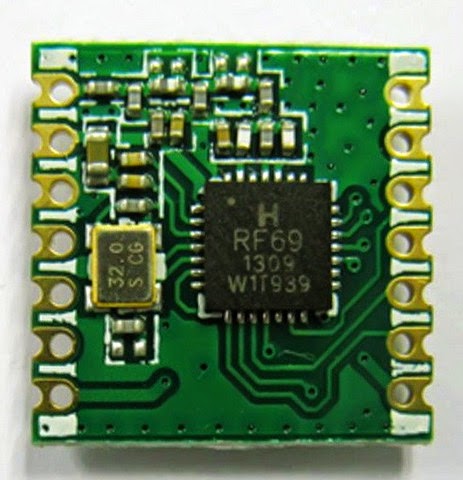Introducing RFM69CW
About a year ago Hope RF announced the RFM12B to be 'EOL' (End-of-Life), there has been a degree of confusion as to what exactly this means; currently manufacture of the module is still taking place and supply is still easily available. However, we acknowledged that the time had arrived to look for alternatives since Hope RF no longer offers support or recommends the RFM12B for new products.
An obvious alternative that was explored by JeeLabs is the Hope RF RFM69CW module, it uses SEMTEC designed silicon (as opposed to Silicon Labs in the RFM12B). It's pin-compatible with the RFM12B. Using the updated JeeLib driver the RFM69CW is be backwards compatible with RFM12B helping users of RFM12B to make a smooth transition. Thanks to JCW from JeeLabs and LowPower Labs for the work on developing the RFM69CW Arduino library. We have been working with JeeLabs to source modules and test the driver software.
 |
| Hope RF RFM69CW |
I will let JeeLabs/DigitalSmarties introduce the module
"The recently announced RFM69CW radio module by HopeRF is a compact, powerful radio transceiver module for swapping data packets in the 868 MHz ISM band, using standard and enhanced FSK modulation. Great for sub-compact designs; just 4mm of mounted height from using an SMD precision crystal.
Though consuming a similar level of power, the RFM69CW receiver section can decode fainter signals than the classic RFM12B. The transmitter section *maximum* output power is +13dBm, considerably higher than the +5dBm of the RFM12B. The current drain at these (adjustable) higher power settings is correspondingly higher. With the better receiver sensitivity, many applications will not need to use the higher transmit power settings, potentially saving on battery life.
Comparing like-with-like, pairs of modules will generally have greater range and/or better penetration of walls/ceiling than when using pairs of the classic RFM12B.
The physical module is compatible with the PCB footprint on all current JeeNodes and JeeLinks. For details of the fast-evolving level of software support, see this Forum topic.
Control is via a fast SPI bus with reduced MPU loading. The recommended power supply range of 1.8 < Vdd < 3.6 V can squeeze almost the last energy out of depleting batteries without needing a boost converter."

Comparison tabled compiled by http://www.mikrocontroller.net/articles/RFM69
Early next year we will start transitioning to the RFM69CW, end-users should not notice a difference apart from a new input on the emoncms Inputs page 'RSSI' (Received Signal Strength Indicator), see below.
To simplify manufacture and module sourcing we will be standardising on 433Mhz, we will make available no-RF versions of units for users who wish to solder on their own 868Mhz modules. See forum thread
.JPG&container=blogger&gadget=a&rewriteMime=image%2F*) |
| RFM69CW on the emonTx V3.4 |
For early adopters we have limited numbers of RFM12Pi Raspberry Pi Expansion with RFM69CW module in the shop. Using the latest emonHub software (currently in 'Testing' branch) using the RFM12Pi with RFM69CW on a Raspberry Pi should be seamless, emonHub automatically detects the higher baud rate requirement of the RFM12Pi with RFM69CW (56700 as opposed to 9600 with RFM12B RFM12Pi) sets baud accordingly and starts posting RSSI (received signal strength indication) to emoncms.
 |
| RFM69CW on the RFM12Pi on Raspberry Pi Model B+ |
 |
| Example RSSI value from emonTH in emoncms |
The RSSI readings are very useful as they give a quantitative means of comparing RF performance which should help when deciding on the positioning of units during install and developing better antenna setups.
 |
| RSSI readings from nodes setup in my house (mix of RFM12B and RFM69CW) |
 |
| RFM69CW on the upcoming emonPi Raspberry Pi Energy Monitoring Shield (due for launch in the new year) |
For more info on the RFM69CW see Building Block Overview Page:
http://openenergymonitor.org/emon/buildingblocks/rfm69cw